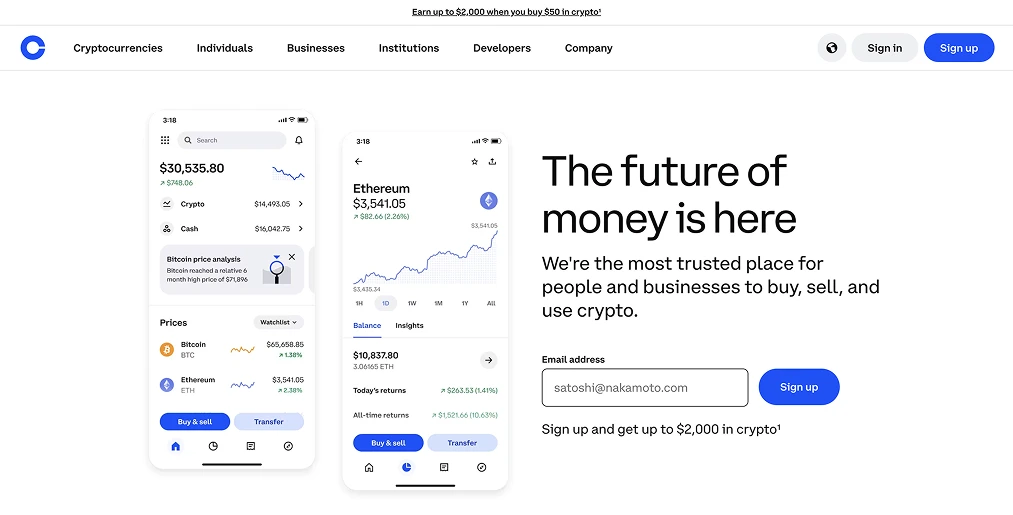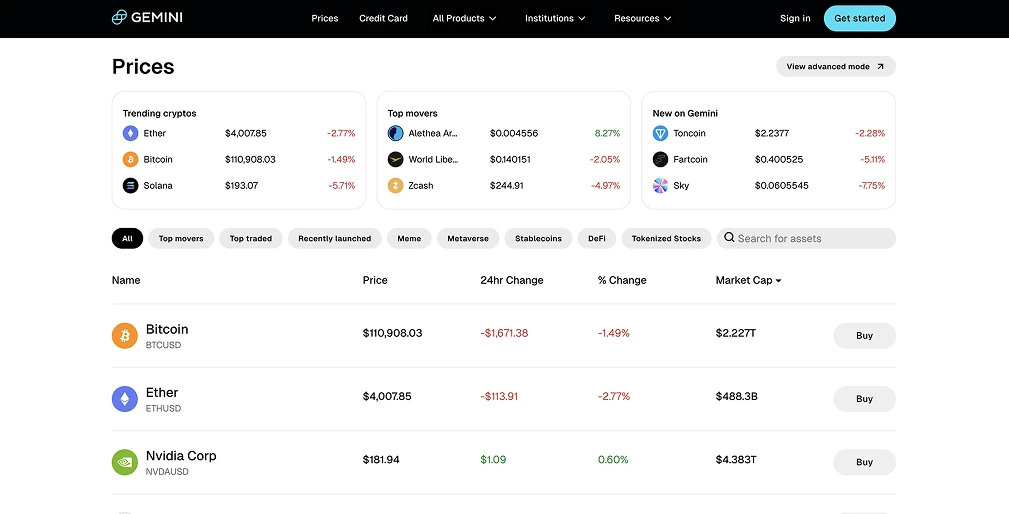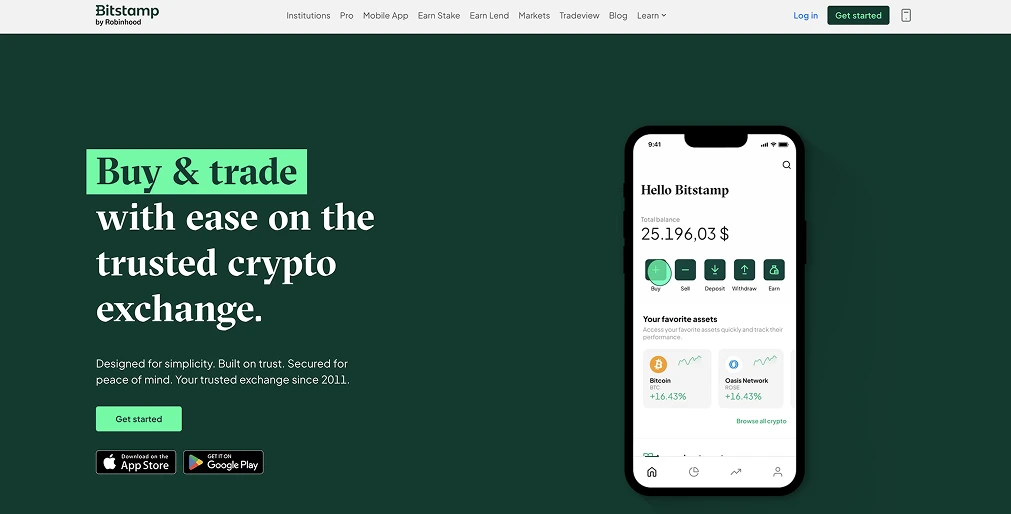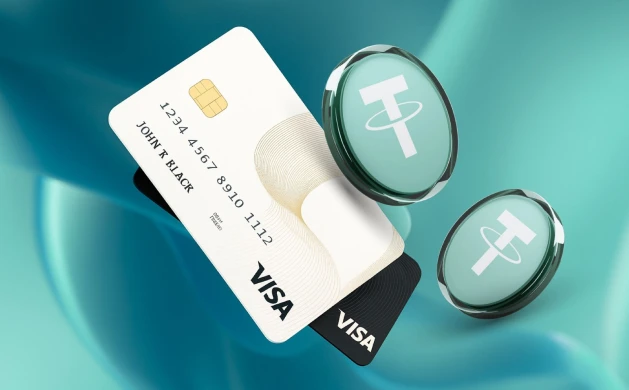Best Crypto Exchanges in New York for 2025
.webp)
Summary: New York runs the most heavily regulated crypto market in the USA requiring every exchange to hold a BitLicense or operate as a state-chartered trust company under the New York State Department of Financial Services (NYDFS).
These rules impose strict standards on custody, reserves, AML, and cybersecurity, ensuring investor protection and full transparency.
Below are the best NYDFS-approved exchanges for New York investors in 2025:
Coinbase is the top choice for New York residents thanks to its NYDFS BitLicense, unmatched security, and broad range of regulated crypto assets with staking.
Available Assets
250+ Cryptocurrencies
Regulation & Licensing
BitLicense by the NYDFS
Deposit Methods
ACH, Wire, Cards, PayPal and More
Top Crypto Trading Platforms in New York
Crypto trading in New York is regulated under the BitLicense framework, which sets stricter standards than those for crypto exchanges in the USA. Only platforms licensed by the New York State Department of Financial Services (NYDFS) can operate, creating a smaller but more tightly regulated market.
Traders in New York favor platforms with strong liquidity, transparent fees, and reliable USD funding through ACH, wire, or debit card. Credit card use remains limited due to banking restrictions under BitLicense oversight.
The table below compares leading BitLicense-approved exchanges in New York by fees, deposit options, asset coverage, and key features.
1. Coinbase - Most Trusted Exchange in New York
Coinbase is the best crypto exchange in New York for its regulatory trust, security record, and feature depth. Its operation there is backed by a BitLicense granted by NYDFS in 2017, meaning it meets the state’s strict rules for custody, transparency, capital, AML, and consumer safeguards.
It offers a polished interface for new users and Coinbase Advanced for serious traders, with real-time order books, charting tools, and customizable orders. Its wallet app lets users interact with DeFi, NFTs, and DApps, without exposing private keys in the main account.
Recently, Coinbase obtained regulatory approval to enable staking in New York, allowing residents to earn rewards on assets like ETH and SOL. It is also preparing to roll out CFTC-compliant perpetual futures in the U.S., subject to state-level constraints.
Coinbase Platform Highlights:
- Fees: 0.2% - 0.5% on standard trades, with Coinbase One members eligible for zero-fee trades
- Assets: 200+ cryptocurrencies
- Regulation & Licensing: Holds NYDFS BitLicense under 23 NYCRR Part 200 for virtual currency business activity
- USD Funding: ACH, domestic wire, debit/credit card

2. Robinhood - Most Beginner-Friendly Exchange in New York
Robinhood is one of the few platforms licensed to offer crypto and stock trading in New York under a BitLicense issued by the NYDFS in 2019. It provides a regulated and simple way for retail investors to access digital assets.
Its mobile-first design, instant USD deposits, and integration with equities make it ideal for beginners. However, its crypto offering in New York is narrower than in other states, with fewer supported tokens and limited staking and transfer features due to local restrictions.
Trades are commission-free, though Robinhood earns from small spreads that can widen during volatile markets. Robinhood Gold adds professional research, higher deposit limits, and margin trading for active users.
Robinhood Platform Highlights:
- Fees: Commission-free; spreads usually under 2%
- Assets: Limited NYDFS-approved tokens including BTC, ETH, LTC, BCH, and DOGE
- Regulation & Licensing: Holds a BitLicense and money transmitter license from NYDFS
- USD Deposit Methods: ACH, bank transfer, debit/credit card

3. Gemini - Most Regulated Exchange in New York
Gemini is one of New York’s earliest and most regulated crypto platforms. Founded in 2014, it became the first exchange to receive a limited-purpose trust charter from the NYDFS in 2015. This structure subjects Gemini to strict fiduciary, capital, and compliance requirements under state banking law, providing stronger oversight than a standard BitLicense.
For New York users, Gemini offers ActiveTrader® with deep liquidity, advanced order types, and detailed analytics. It also provides staking on select assets, a crypto rewards credit card, and the Gemini Wallet for secure storage and DeFi access.
In 2024, Gemini reached a $1.1 billion settlement agreement with NYDFS to reimburse Earn program users following a third-party partnership failure. The resolution reinforced Gemini’s regulatory cooperation and commitment to operating under full NYDFS oversight.
Gemini Platform Highlights:
- Fees: ~0.2% for ActiveTrader, ~1.49% for retail trades
- Assets: 70+ cryptocurrencies
- Regulation & Licensing: Chartered as a New York limited-purpose trust company, regulated by NYDFS under New York Banking Law
- USD Deposit Methods: ACH, wire transfers, debit card

4. eToro - Best Multi-Asset Platform
eToro entered New York in 2024 after receiving a BitLicense and money transmitter license from the New York State Department of Financial Services (NYDFS) via eToro NY LLC. This approval allows residents to trade crypto, stocks, and ETFs on a fully supervised platform.
The platform blends crypto access with social investing tools. CopyTrader lets users mirror top traders, while Smart Portfolios offer diversified exposure across digital assets and equities. eToro also supports fractional stock and ETF trading for smaller investors.
Due to U.S. regulatory restrictions introduced in 2024, New York users can currently trade Bitcoin (BTC), Ethereum (ETH), and Bitcoin Cash (BCH), with more assets expected pending NYDFS approval.
eToro Platform Highlights
- Fees: Transparent flat spreads averaging ~1% per crypto trade
- Assets (NY): BTC, ETH, BCH, plus U.S. stocks and ETFs
- Regulation & Licensing: Licensed under NYDFS as a BitLicense and money transmitter; FINRA-registered U.S. broker-dealer
- USD Deposit Methods: ACH, bank transfer, debit/credit card

5. Bitstamp - Fully Licensed Global Exchange in New York
Founded in 2011, Bitstamp is one of the world’s oldest and most trusted exchanges. Its U.S. arm, Bitstamp USA Inc., holds a BitLicense from the New York State Department of Financial Services (NYDFS), issued in 2019, authorizing crypto and USD trading for New York residents.
In New York, Bitstamp supports BTC, ETH, LTC, BCH, and XRP trading pairs, with more assets pending NYDFS approval. The platform offers a simple interface for everyday users and advanced APIs for institutions needing fast execution and deep liquidity.
Security is central to Bitstamp’s model, with 98% of assets in cold storage, multi-factor authentication, and regular external audits. USD balances are held with regulated U.S. banks and insured up to legal limits.
Bitstamp Platform Highlights
- Fees: 0.5% for trades under $10,000; lower at higher volumes
- Assets (NY): BTC, ETH, LTC, BCH, XRP
- Regulation & Licensing: NYDFS BitLicense and federal MSB registration
- USD Deposit Methods: ACH, wire, debit/credit card

Is Crypto Legal and Regulated in New York?
Cryptocurrency is legal in New York and regulated by the New York State Department of Financial Services (NYDFS) under the BitLicense framework in 23 NYCRR Part 200. While not legal tender, digital assets can be bought, held, and traded through NYDFS-licensed firms or limited-purpose trust companies.
Since 2015, businesses offering virtual currency services to New York residents must obtain a BitLicense or trust charter, meeting strict standards for custody, capital, AML/KYC, and consumer protection.
NYDFS also enforces cybersecurity rules under Part 500, expanded in 2023 and 2024 to strengthen governance, incident reporting, and risk management for all regulated financial and crypto institutions.
💡 Regulation Timeline in New York
- 2015: BitLicense introduced, requiring licensing for all virtual currency activity in New York.
- 2017: Cybersecurity Regulation (Part 500) implemented for financial and crypto entities.
- 2020: NYDFS launches the Greenlist framework for pre-approved assets and clearer application guidance.
- 2022: Stablecoin guidance by the NYDFS mandates full reserve backing, redemption rights, and independent attestations.
- 2023: Updated coin-listing and delisting rules require exchanges to maintain strict asset review policies.
- 2024: NYDFS strengthens Part 500 cybersecurity obligations, adding stricter governance and access controls.
- 2025: NYDFS continues to expand licensing, maintaining New York’s reputation as the most tightly regulated crypto market in the United States.
New York’s model focuses on transparency, investor protection, and operational integrity, giving residents access to a safer, fully supervised crypto environment unmatched elsewhere in the U.S.
Is Crypto Taxed in New York?
Yes. The IRS treats cryptocurrency as property, so gains from selling, trading, or spending are taxed federally as capital gains. Long-term gains face rates of 0%, 15%, or 20%, plus a 3.8% NIIT for high earners, while short-term gains are taxed as ordinary income at 10%-37%.
New York State taxes all gains as ordinary income at 4%-10.9%, and New York City adds 3.078%–3.876% for residents.
Business income
Income from mining, staking, market-making, or operating a crypto business is taxed as ordinary income. Individuals may also owe 15.3% self-employment tax, while corporations pay New York’s corporate income tax and, in NYC, the General Corporation Tax of up to 8.85%.
Individual investors
- Short-term gains (≤ 1 year): taxed federally at 10%–37%, plus New York State (4%–10.9%) and City (3.078%–3.876%) rates.
- Long-term gains (> 1 year): taxed federally at 0%, 15%, or 20% (+ 3.8% NIIT if applicable), with New York still treating them as ordinary income.
- Mining, staking, airdrops: taxed as ordinary income when received at fair market value.
💡 Example: Crypto Trade in New York
You buy 1 ETH for $5,000 and sell it eight months later for $6,500, making a $1,500 profit. Federally, it’s taxed at your short-term rate (10%-37%), New York State adds 4%-10.9%, and New York City adds 3.078%-3.876% if you’re a resident.
How to Buy Bitcoin in New York
The most secure way to buy Bitcoin (BTC) in New York is through exchanges licensed by the New York State Department of Financial Services (NYDFS) under the BitLicense regime. These platforms meet strict capital, custody, and compliance standards.
- Choose a Licensed Exchange: Pick a platform approved by NYDFS. Reputable exchanges support USD funding, transparent fees, and audited reserves. Confirm the exchange’s BitLicense status on the NYDFS registry.
- Create and Verify Your Account: Sign up with your email or phone number and complete KYC verification using a government-issued ID and proof of address. Verification is mandatory before deposits or trading.
- Deposit USD: Add funds through ACH transfer, domestic wire, or debit card. ACH deposits usually clear within one to two business days, while card payments are instant but often carry higher fees.
- Buy Bitcoin (BTC): Go to the BTC/USD market, enter the amount, and confirm the order. Market and limit orders are available, and settlement is typically immediate.
For long-term security, move your BTC to a private wallet. Hardware wallets like Ledger and Trezor offer the strongest protection, while trusted mobile wallets suit smaller balances or regular transactions.
Final Thoughts
If you live in New York, always trade through an NYDFS-licensed exchange to stay compliant and protect your assets. These platforms meet strict custody and cybersecurity rules, giving you safer access to Bitcoin and other cryptocurrencies.
Before investing, confirm the exchange’s BitLicense status on the NYDFS website to ensure full regulatory protection.
Frequently asked questions
Is Kraken available in New York?
No. Kraken does not currently hold a BitLicense and therefore cannot legally serve retail traders in New York. The exchange withdrew from the state in 2015 following the introduction of the BitLicense framework and has not re-applied for authorization under NYDFS.
Is Binance US available in New York?
No. Binance.US is not licensed to operate in New York and is excluded from the state due to NYDFS regulatory requirements. Residents can only use fully authorized platforms that hold a BitLicense or trust charter.
Which crypto wallets work best with New York exchanges?
Most NYDFS-approved exchanges integrate with leading self-custody wallets like Ledger, Trezor, and MetaMask (for supported assets). These wallets let users hold their private keys securely while maintaining compatibility with compliant exchanges.
Can New York investors access DeFi or Web3 apps legally?
Yes, but only through self-custody wallets connected to decentralized protocols. DeFi activity itself isn’t regulated by NYDFS, but funding these wallets with crypto from licensed exchanges ensures compliance with New York’s AML and KYC requirements.
%2520(1).webp)
Written by
Antony Bianco
Head of Research
Antony Bianco, co-founder of Datawallet, is a DeFi expert and active member of the Ethereum community who assist in zero-knowledge proof research for layer 2's. With a Master’s in Computer Science, he has made significant contributions to the crypto ecosystem, working with various DAOs on-chain.


.webp)

.webp)




